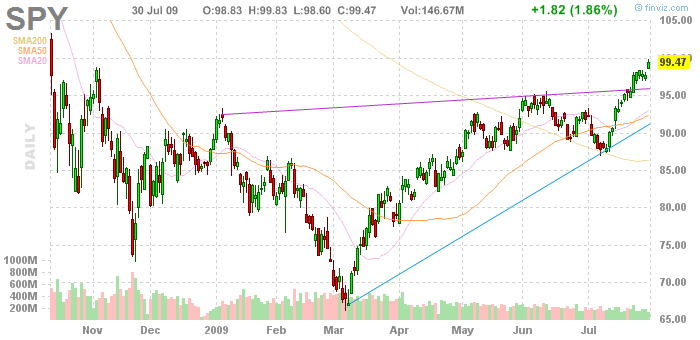an excellent analogy explaining why banks don't need more money they just need more time. (From Accrued Interest Blog)
First, let me start with an analogy.
I have a good friend, also in the finance business, who bought a condo about 2 1/2 years ago. It was part of an apartment building rehab, but is located in a very sought-after zip code in suburban Baltimore. And its a beautiful place. When my wife and I first went there she jokingly said we should sell our place and buy his.
Unfortunately for him, not only did he buy at the top of the housing market, but the builder doing the rehab went under and sold the project. The new owners are going to continue the rehab, but leave it as rentals, not convert to condos. So that's absolutely destroyed the value of his place. I'd guess in the -50% area or some such.
Now this guy is relatively young, and while I don't know much about his personal finances, I know he doesn't have huge amounts of liquid assets. So I can safely say that he owes more on his house than his entire net worth.
And yet he's earning a good income, as does his wife. In fact, he told me that he is well under the debt-to-income number that Obama's foreclosure relief plan is targeting. So I have no reason to believe he's going to default on his loan. Still, based on a simple assets vs. liabilities calculation, the dude is insolvent.
Obviously the bank would be incredibly stupid to foreclose on him now, even if the bank had that right. Allowing my friend to remain a "going concern" makes much more sense. Granted, the risk my friend poses has gone way up, as there is no longer any equity cushion. But if the bank were to foreclose now they'd be looking at a 50ish percent loss. Whereas if they look the other way and let the cash flows play out, my friend is very likely to pay off his loan.
Now stepping back, there are a lot of financial institutions in this same boat. They have gigantic paper losses, yet little in cash flow interruption. This brings us to the GE Capital discussion of the last couple days. I've mentioned a fundamental problem the finance sector is currently dealing with. This is essentially the source of my kobayashi maru title from the other day.
- Financials have made many investments (be it in loans, properties, securities etc.) that they wouldn't make today, at least not at the original terms.
- However, some of these investments will eventually work out alright from a cash flow perspective. Some won't.
- It stands to reason then that some financial firms will own more "good" investments and some will own more "bad" stuff. Only with time will we really know who is which.
- Unfortunately, the market isn't giving firms much time. The door for raising new equity money is now pretty much closed for any financial, and wild trading in CDS is stoking more fear.
Ideally we'd like to give financial institutions time to sort out who is who here, but private investors aren't going to accommodate. I mean, as a bond manager, I wouldn't be waiting around for three or four years to see if GE Capital can work through their problems. Investors as group, we made that mistake with Bear Stearns and Lehman and AIG and Merrill Lynch and WaMu and Wachovia and GSE preferreds and Citigroup etc. etc. etc. etc. etc. Most pros got stung or nearly stung with one or more of these disasters. We aren't waiting around any more.
This should be the focus of government programs to cleanse the financial system. Creating time. Otherwise, as Keynes said, we're all dead.




